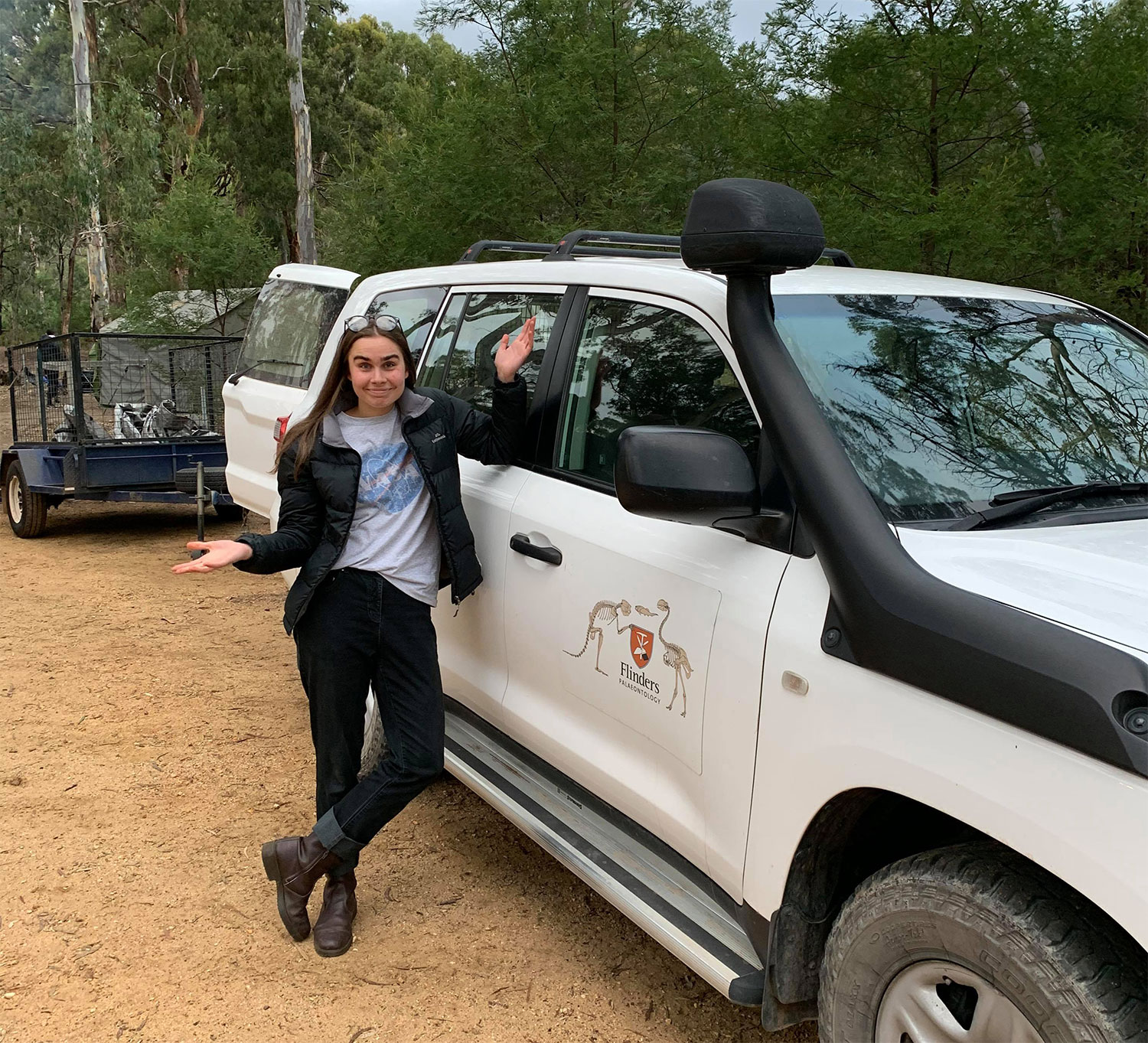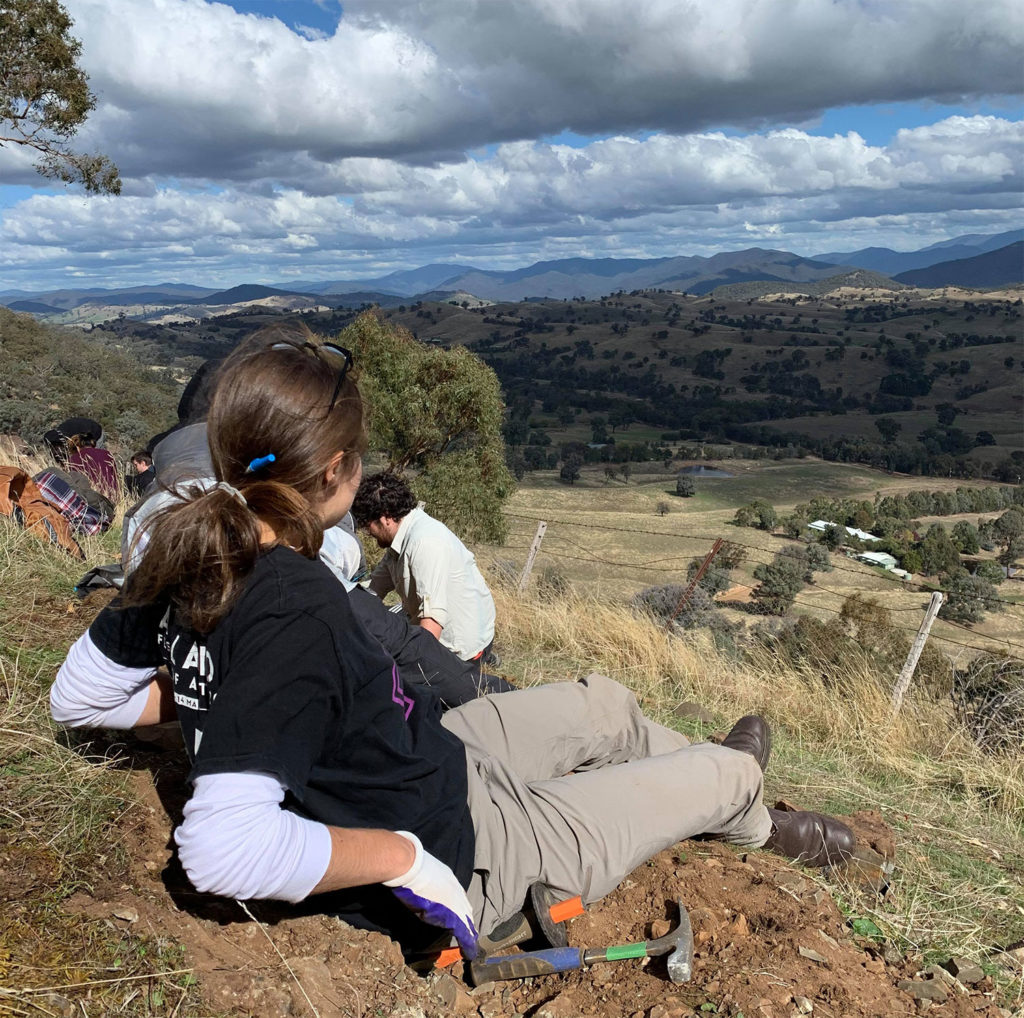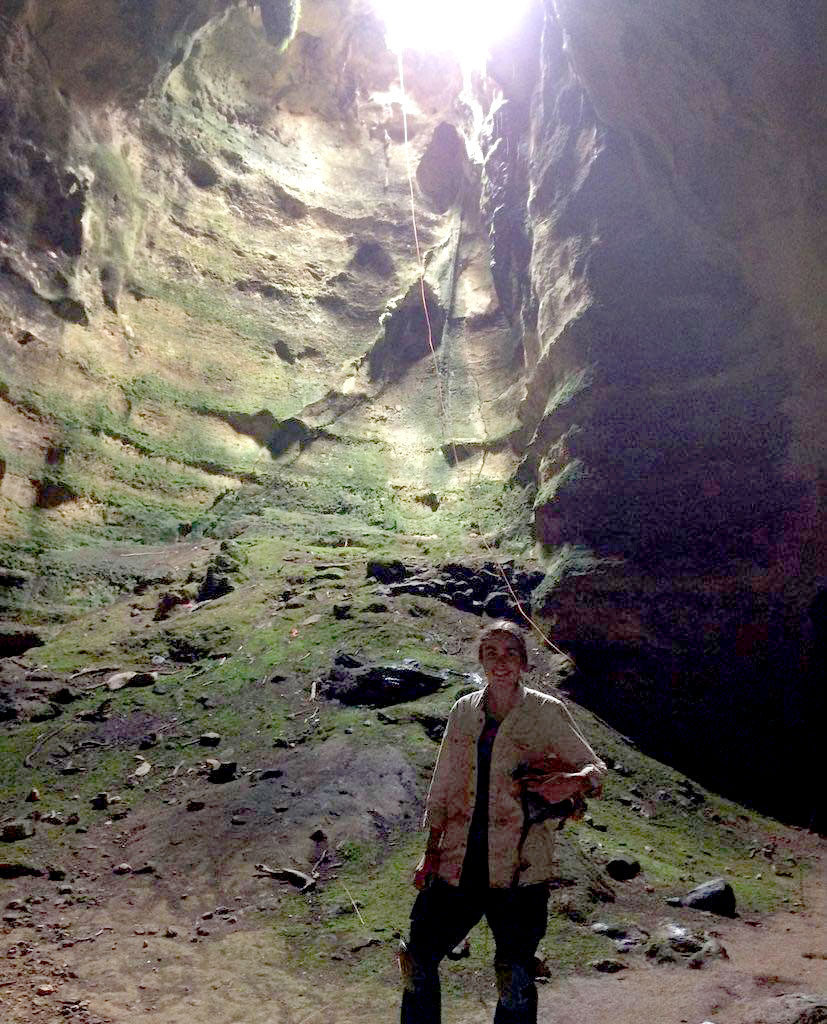
Give a general description of your studies.
I’m in a double degree combining the Bachelor of Science (Palaeontology) with the Bachelor of Archaeology – so if there’s anything in the ground, I’ll be digging it up! The palaeontology course is built up by earth science and biology subjects, but its unique flavour comes from the specialty palaeo topics where we learn to put it all into practice. We learn to collect, identify and analyse fossils to essentially tease out the story of an animal: how, where and when it lived – a bit like detectives who are very late to work.
What excites you about Palaeontology? Why did you decide to go down this path?
I’m the adventurous type – I never wanted a degree or a job that was simple or rigid, where I could never be creative and every graduate ended up in the same place. Palaeontology at Flinders is exciting because it is always changing, and puts to good use a diverse range of skills, ideas, perspectives and spaces. When I started Uni I couldn’t choose between science and history, between art and research, between indoors and outdoors, but luckily for me, I didn’t have to because I get them all in my course.

Why was Flinders the right choice? What makes Flinders stand out from other universities?
There is no doubt Flinders is the best choice for palaeontology students, not only in Adelaide, but across Australia. Their department is world-class, and their teachers more so. Palaeontology at Flinders in particular stands out because it so readily encourages each person to go in their own direction. Because of the breadth of resources and abundance of internationally-acclaimed experts, you’re supported and uplifted no matter your particular interest, be it dinosaurs, kangaroos, reptiles, birds, sharks, or anything from primordial to modern. But don’t worry if you’re not sure what you like – you’ll get a taste of everything!
Another major benefit to studying palaeontology at Flinders is that the archaeology department there is just as good. The two disciplines, which are beginning to cross over more and more, complement each other like fresh lobster and fine wine, and it’s a pairing unheard of at any other university in the country.
Describe your learning experience at Flinders; What key areas of your studies most excite you, or are stand outs due to the topic, the lecturer or other elements?
My learning experience at Flinders has been varied in that there are so many different, interesting topics to choose from depending on your preferred strain. I’ve learnt about things from primitive, Chinese fish, to the hydraulic infrastructure of ancient Cambodia, and from the levers inside a kangaroo’s legs to the complex societies of Australia’s First Nations peoples.
One stand-out feature of studying palaeontology at Flinders is that students are always treated as prospective researchers – our lecturers believe in us to do real research and to think about real problems. We are taken into the field and trusted to collect fossils and data, asked about our opinions and questions, and given access to excellent resources. From day one I’ve not only been encouraged to do important and good work in my field, but I feel that I’ve been expected to, which is incredibly empowering.
Describe the Flinders’ environment. What physical aspects of Flinders stand out?
The Flinders campus is one of main reasons I chose this Uni, and has become a major part of why I love it so much. Having the Uni physically centred around the lake and bushland is a gamechanger; between every class I get a good dose of nature’s green beauty, the sounds of native birds and the sweet smell of fresh air. Research continues to show that that keeping nature close is one of the best things we can do for our wellbeing, and the Flinders’ environment regularly gives me reason to be grateful and outward focussed, no matter my grades.
Another aspect of the Flinders environment that I have appreciated over my studies is the artworks dotted around the campus, primarily in the form of sculptures. There are abstract and realistic works in various courtyards around Bedford, but the ones that stand out are the series of tall, metal feathers outside the Hub. They were designed by a First Nations artist and inspired by Indigenous culture, and they remind me of where I am and those who have been here before me.

What practical placements or experiences have helped along the way?
I’m yet to go on placement or work experience, but through the palaeo stream I’ve had numerous opportunities to go into the field and really get my hands dirty. Extended trips to the World Heritage fossil caves at Naracoorte and to various palaeozoic sites in Victoria have helped immensely in my understanding of palaeontology and have cemented my love for uncovering the past! The field trips are undeniably enthralling, eye-opening and 100% fun. They give you a chance to connect with the big, old earth we live on and have a good laugh – all while earning credits!
Your future career plans. Where do you see your studies taking you?
Currently I have my sights set on postgraduate qualifications (honours/masters), and have an even loftier goal to snatch a PhD at some point. One great thing about palaeontology, and archaeology too, is that further studies can be taken in almost any direction you like – from isotopes, to bones, to footprints, and from Australia to Asia to Antarctica – and that the job or research you get into after that could be something different again! The academic competition within this field is daunting, but equally exciting, and I can’t wait to find my niche! I’d love to work in Australia combining the two fields and looking at how animals and people interacted in ancient times, which is something not very well studied at this point.
Tell us why you would recommend studying Palaeontology at Flinders?
I would recommend Flinders for three major reasons: 1) every day I’m on campus I walk among trees and birds and get a view of the sky stretching over the city and ocean – the beauty of the university is something I treasure; 2) the international standards of the Flinders palaeo department mean I know my degree is giving me the best opportunity to thrive personally and to really contribute to the discipline in a meaningful way; and 3) Flinders is a Uni for the future in that it has humble, connected and relatable foundations, its students are believed in and its facilities are always growing.

